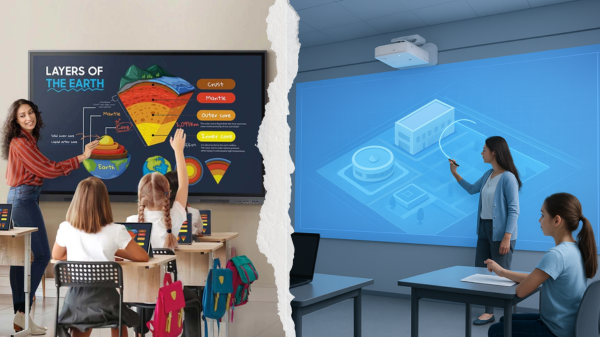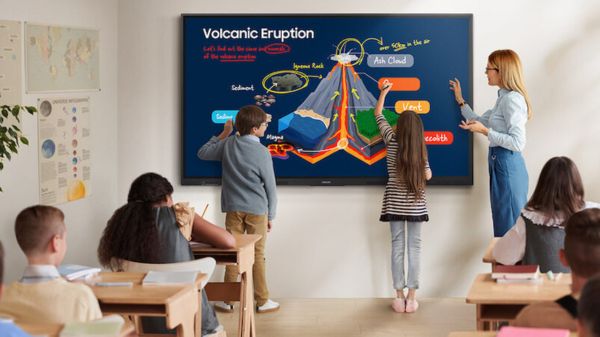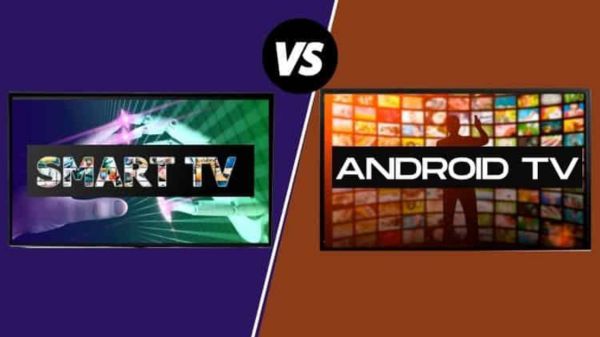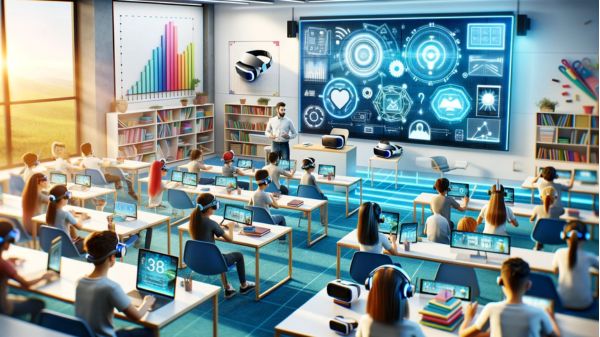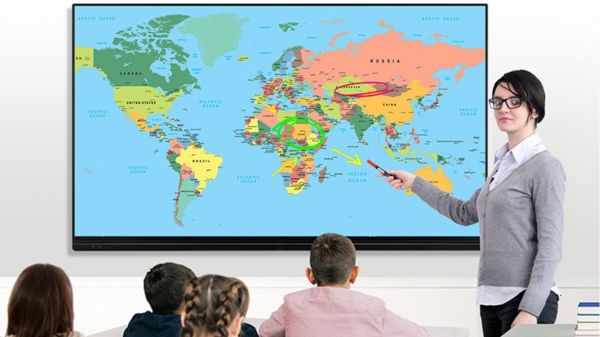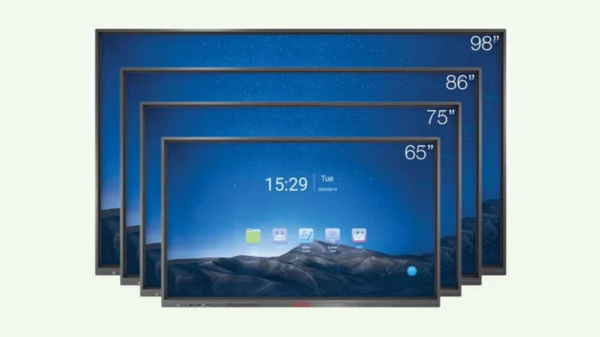- Display Quality & Visibility
- Interactive Panels provide clear, Ultra HD visuals with bright colors and anti-glare screens, performing well in bright classrooms.
- Projectors depend a lot on the lighting and screen surface. Bright or uneven lighting can cause images to look washed out, create shadows, or appear faded. Even modern high-lumen models have trouble in uncontrolled settings.
- Interactivity & Engagement
- Interactive Panels feature smooth multi-touch support, pen and finger input, on-screen annotation, real-time collaboration, split-screen options, and built-in educational tools.
- Projectors need extra hardware, like pens and sensors, and require calibration. They often support only single-point interaction, making group work less intuitive.
- Installation & Maintenance
- Interactive Panels are easy to set up with a wall mount or trolley stand and don’t need calibration. They are made with durable LED technology and require little maintenance.
- Projectors involve complicated installation with mounts, throw distance setup, surface alignment, and regular calibration. They require bulb and filter replacements, increasing maintenance costs.
- Cost Over Time
- Interactive Panels have a higher initial cost but lower long-term expenses due to their durability, low maintenance, and energy efficiency.
- Projectors are cheaper to buy upfront, but the costs for bulbs, filters, and calibration can add up over time.
- Flexibility & Use Cases
- Interactive Panels are ideal for standard classroom walls or mobile setups where touch interaction and integration with educational tools (like Google Classroom, video conferencing, cloud) are important.
- Projectors can project onto different surfaces, including floors and walls. They are great for large spaces like gyms or breakout rooms, for immersive games or physical education. Laser and LED projectors add durability and brightness.
- Sustainability & Energy Efficiency
- Interactive Panels use energy-saving LED technology, produce less heat, and often include eco-friendly features.
- Newer laser projectors use less mercury and consume less power, but they still generate more heat and need careful disposal.
- Accessibility & Versatility
- Interactive Panels include features like screen readers, magnification, multilingual interfaces, and adjustable mounts to support diverse learners.
- Projectors usually lack built-in accessibility features and often need external assistive devices.
- Classroom Size Considerations
- Interactive Panels may be limited in size (70–100 inches) and are less suitable for large spaces where back-row visibility is crucial.
- Projectors can display large images, which work well in auditoriums or dynamic environments.
Interactive Panels vs. Projectors: A Smarter Investment?
Decision Guide: Which One to Choose?
| Priority | Choose Interactive Panel If... | Choose Projector If... |
|---|---|---|
| Interactivity & Collaboration | You need multi-touch, real-time lesson annotations, seamless software integration | Interactivity is not essential or limited to basic presentations |
| Visual Clarity & Lighting | The classroom is bright or requires high-resolution text and images | You have good control over lighting or only need occasional use |
| Long-Term Costs & Maintenance | You prefer low upkeep and long-lasting equipment | Budget limits mean upfront cost is the main concern |
| Space & Flexibility Needs | Regular classroom lessons with set display spaces | You need to adapt spaces like gyms, walls, or floors |
| Accessibility & Inclusion | You need built-in accessible features for all students | Special accessibility tools can be provided separately |
| Environment & Sustainability | Energy efficiency is important and you prefer LED technology | New laser projectors can also be environmentally friendly |
| Room Size | Medium or small classrooms | Large areas that need wide visuals |
Final Verdict
SoftLogic’s Interactive Panels are usually the better investment for most traditional classrooms. They provide better visual quality, ease of use, strong interactivity, low maintenance, and long-term value, making them great
for creating modern, engaging learning environments.
However, Projectors still have their place where flexibility, large-scale projection, or tight budgets matter, such as in gyms, multipurpose halls, or schools needing visuals across various surfaces.

